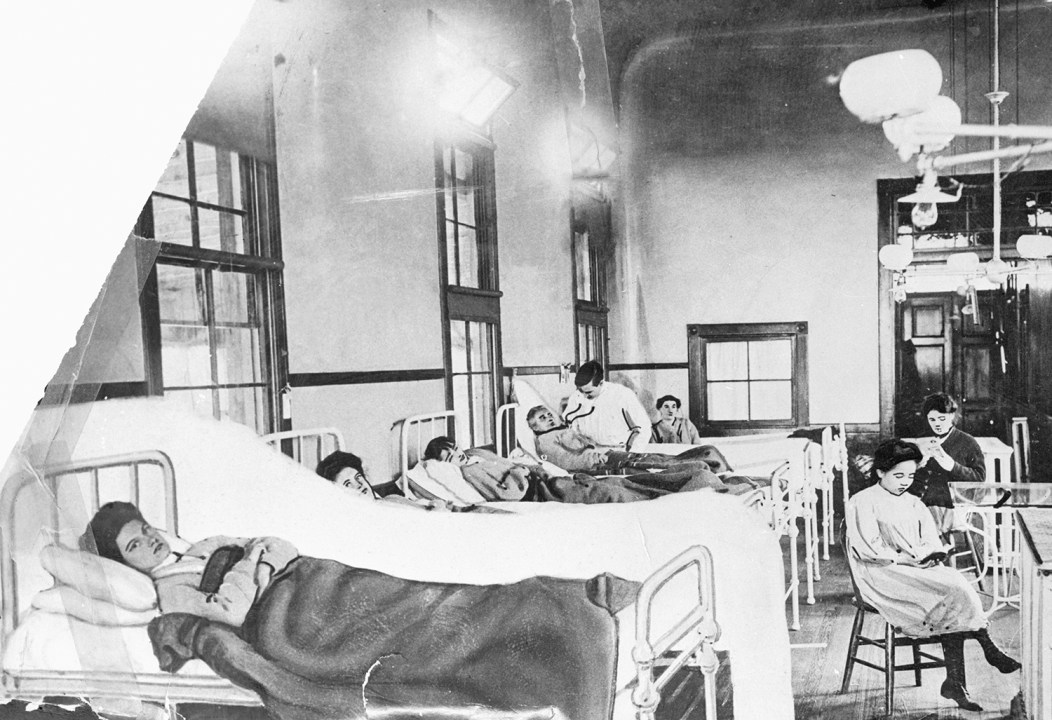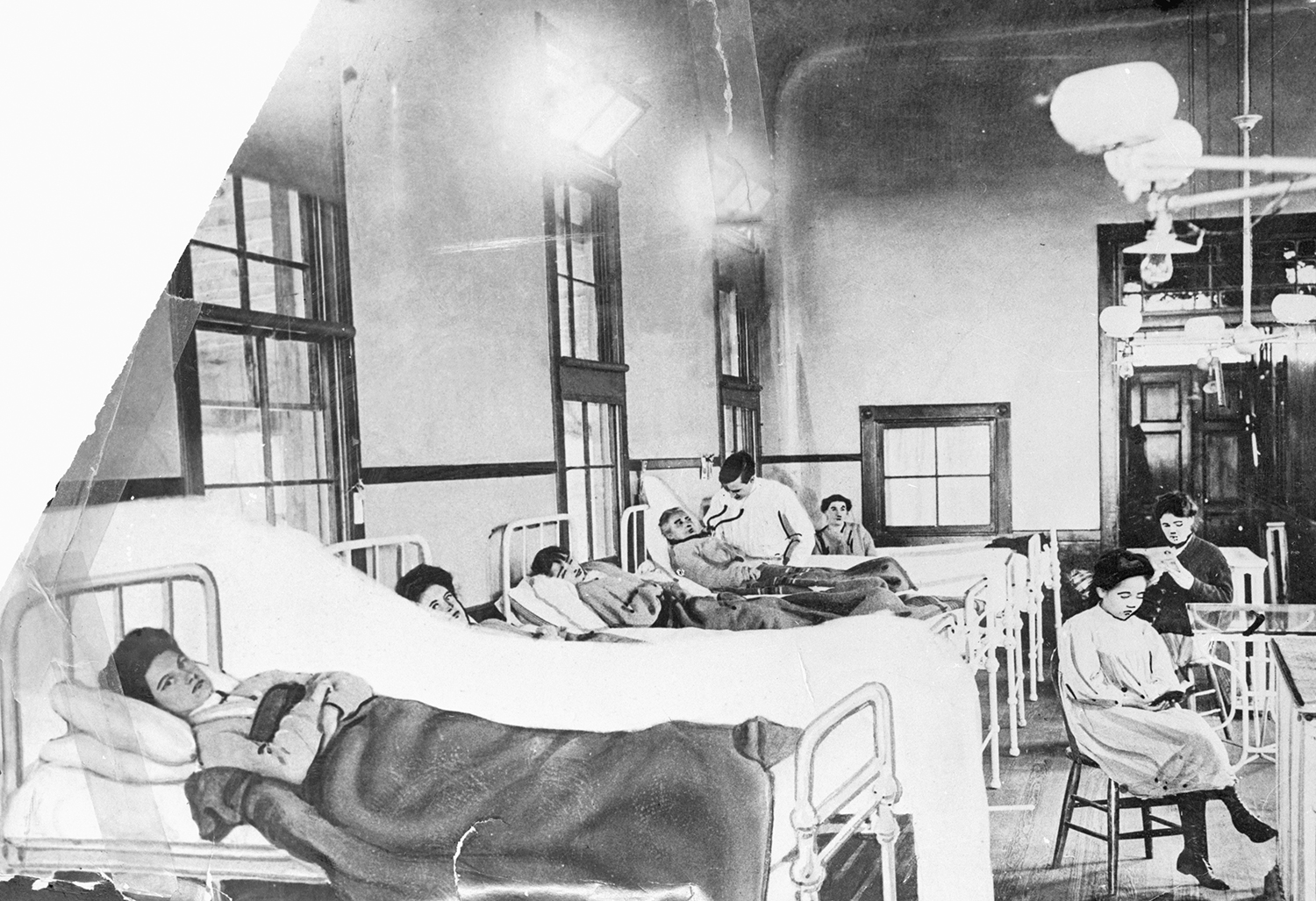Radio works its strongest magic, I always think, when you listen to it in the dark. The most reliable example is the Shipping Forecast, that bracing incantation of place names and gale warnings, which – with the lights out – can transform even the most inland bedroom into a wind-battered coastal cottage. But darkness can heighten disturbance, too, as I was reminded when listening to Danger by Richard Hughes, billed as the BBC’s first-ever radio drama. It was first broadcast in 1924, with the audience at home under instructions to maximise its effect by turning off all their lights.
The play’s first audience, in 1924, was under instructions to maximise its effect by turning off all their lights
This version of the play – now on Radio 4 Extra – was recorded in 1973, but I followed the original edict and settled expectantly into the pitch-black. The melancholic strains of Welsh male voices singing drifted forth. Then came footsteps, and a woman’s voice asked anxiously: ‘Hello? What’s happened?’ ‘The lights have gone out,’ replied a man. My goodness, so they have, I thought. As these two stumbled about trying to find each other, the woman pleaded: ‘But the lights, why have they gone out?’ Her companion bluffed a technical explanation, predicting: ‘They’ll turn them up again in a minute.’ I’ll let you into a secret: they don’t.
This young couple, Mary (Carol Marsh) and Jack (Christopher Good), have travelled roughly 1,000ft down a mine, presumably on some kind of tour. They have not only forgotten their miners’ lamps but also become distanced from the others in the group. But they’re not completely isolated: soon an older curmudgeon called Mr Bax (Carleton Hobbs) joins them in the scene, cursing. The stakes get steadily higher when they realise that the mine is flooding.
Whether it was Hughes’s intention or not, all three characters are enjoyably infuriating, seemingly bent on confirming Sartre’s idea that ‘hell is other people’. Mary swings about wildly between brittle silliness and panic, while the men seem keener on philosophising: Jack is by turns bizarrely upbeat about death and anguished that his work as a poet will be cut short, while Mr Bax tries, badly, to argue that an older person’s life has superior value. There are fleeting hints of decency: Bax’s bad-mouthing of the Welsh gives way to admiration for the stoicism of hymn-singing miners, heard elsewhere in the endangered mine.
It’s an oddly mannered mix of bitter comedy and impending doom, and the dialogue is of its time, strewn with terms such as ‘dratted’, ‘beastly’ and ‘tuppenny damn’. But the play’s immersive nature – not least in the sloshing, gurgling sounds of steadily rising water – keeps things compelling, even a century on. Switch off the lights, and hear it out.
A podcast from BBC Radio Ulster’s excellent Assume Nothing series takes us on a different sort of journey through the past, this time with a detective’s hat on. In ‘The Hunt for Typhoid Mary’ Ophelia Byrne investigates the story of the capable Irish-born cook Mary Mallon, who was employed by a number of wealthy US families, notoriously leaving a trail of typhoid fever in each household she departed. The link was noted by Dr George Soper, a sort of hired sleuth of epidemics, who tracked her down in 1907 to a stricken house in Park Avenue. There he confronted Mallon with his theory that she herself was a carrier of the disease, requesting samples of her bodily fluids. Furious, she chased him out with a carving fork.
With the help of various experts, Byrne pursues historical leads – and red herrings – steadily exposing layers and nuances long hidden by lurid headlines. Mallon herself was prone to reinvention, perhaps to enhance her employability in America. She gave her birth date as 1869, and was widely believed to be born in Cookstown, County Tyrone. But records linked to her parents’ names suggest she was born perhaps ten years earlier, and in Killoe, County Longford, in the shadow of the Irish famine. Byrne speculates that with a mother who died young, and a drunkard father, Mallon may have had good reason to lock away a painful past.
Certain details exert a queasy hold on the imagination. Uncooked dishes were the ideal means of transferring typhoid bacteria: Mallon’s speciality for her grateful families, we hear, was peach ice cream. In fairness to Mallon herself, the theory behind Soper’s inquiries – that an apparently healthy person could spread typhoid – was new at the time, and no doubt sounded outlandish to her ears. Where Soper saw a missing puzzle piece in this Irish cook, she saw a man bent on destroying her fiercely won livelihood and independence. There’s much to be explored in further episodes, but after listening to Byrne’s gripping podcast, I searched for a picture of Mary Mallon online. There she was, trapped in hospital quarantine: arms folded, staring directly at the camera. Outwardly robust, and still defiant.








Comments